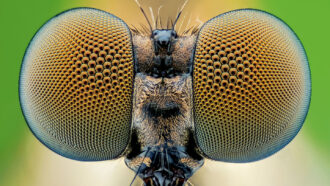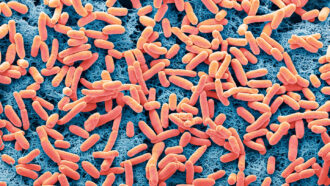Scientists Say
A weekly word defined, in a sentence and in context.
-
 Science & Society
Science & SocietyScientists Say: Thought experiment
Thinking through imaginary, sometimes absurd, scenarios can catalyze new ways of thinking.
-
 Animals
AnimalsScientists Say: Beakiation
Parrots use this clever sidestepping motion to maneuver along thin branches.
-
 Materials Science
Materials ScienceScientists Say: Superconductor
At cold enough temperatures, these materials can conduct electricity with no resistance.
-
 Space
SpaceScientists Say: Astronomical interferometry
This technique links up many telescopes to see the universe in finer detail than any single telescope could alone.
-
 Chemistry
ChemistryScientists Say: Excitation
Excited electrons are to thank for dazzling fireworks displays, plants harnessing energy, the semiconductors behind modern tech and more.
-
 Animals
AnimalsScientists Say: Endotherm and Ectotherm
Endotherms use their own energy to maintain their internal temperature. Ectotherms use external heat sources to control their body temperature.
-
 Chemistry
ChemistryScientists Say: Methane
Used to cook food and heat homes, this potent greenhouse gas accounts for 30 percent of the warming of our climate.
-
 Health & Medicine
Health & MedicineScientists Say: Menstruation
Menstruation is part of a roughly monthly cycle that helps a person’s body prepare for possible pregnancy.
-
 Space
SpaceScientists Say: Cosmic microwave background
The cosmic microwave background is the afterglow of the Big Bang.
-
 Animals
AnimalsScientists Say: Compound Eye
Compound eyes made up of many smaller visual structures may not produce crisp images, but they offer a great field of view.
-
 Math
MathScientists Say: Correlation and Causation
There is a correlation between countries where people eat more chocolate and those that produce more Nobel Prize winners. But beware assuming that one variable causes the other.
-
 Genetics
GeneticsScientists Say: Genetic Engineering
Genetic engineering involves adding, changing or removing certain pieces of DNA from a living thing to give it desired traits.